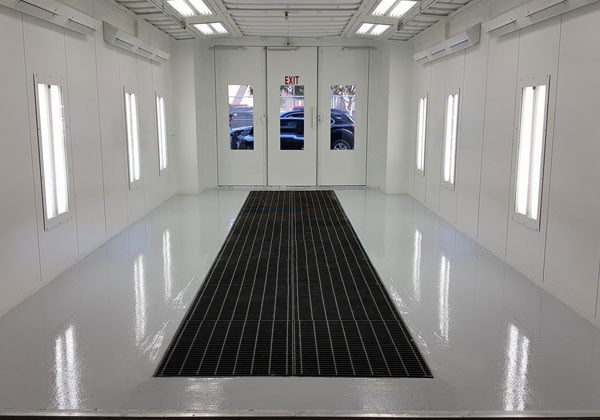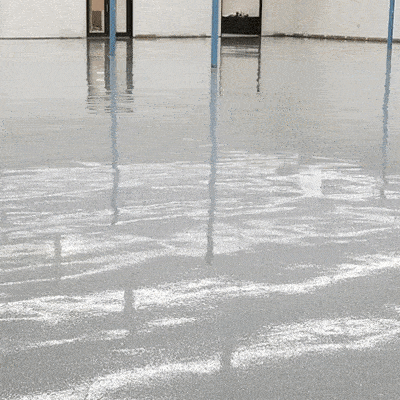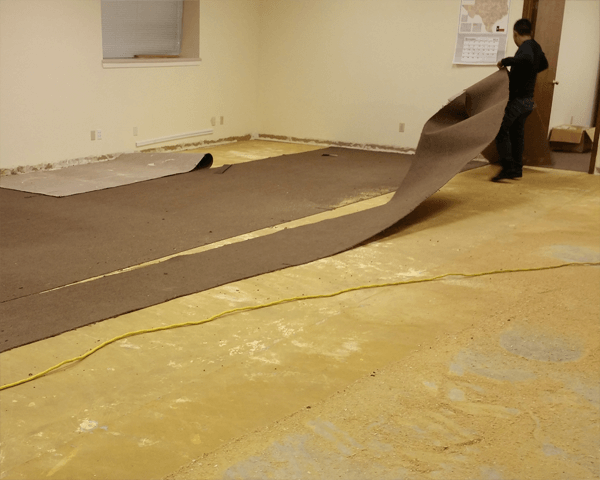Finding an affordable 77040 commercial epoxy floor doesn’t have to be complicated. If you’re a business owner, you simply need to contact our fantastic team at Epoxy Technology Coatings. Since 2005, we’ve provided customers with the highest quality epoxy products and commercial epoxy floor coating services and products in the Houston area.

Our incredible 77040 commercial epoxy floor services can transform any area of your business.
No other epoxy flooring company offers our selection of unique epoxy mixes in over 200 beautiful colors. We provide multiple options for finishes and decorative add-ons, such as blended and brindle flakes. We also sell gorgeous metallic color shades for an elegant look.
Call us today to learn more about our work. To see some of the fantastic flooring transformations we’ve performed for past customers, visit our before and after photo gallery.
Why Should You Choose 77040 Commercial Epoxy Floor?
To demonstrate the excellence and versatility of epoxy flooring, we need to explain what epoxy is and how it works to benefit your business spaces. Epoxy resin is a polymer that consists of two parts, a resin and a hardener. When mixed, these two parts react to form a cross-linked polymer structure that is extremely strong and durable. Epoxy resin is often used as an adhesive or coating and can be applied to various surfaces.
Epoxy resin is resistant to many chemicals, including acids, alkalis, and oils. It is also heat resistant and can be used in high-temperature applications. Because of these properties, epoxy resin is ideal for applications in the kitchen and bathroom. It has a long life span and doesn’t crack or expand in extreme conditions.
Thanks to its durability, epoxy can be left outdoors in all weather conditions and will not deteriorate. Though some types of epoxy resins are vulnerable to UV rays, special additives can be used to strengthen their resistance to sunlight. Other additives can increase its inherent slip resistance, making it much safer to walk on when used for flooring.
Epoxy for Flooring
Epoxy flooring is, evidently, a type of flooring made from epoxy resin. It is typically used in commercial and industrial settings because it is durable and easy to clean. Epoxy flooring is available in various colors and can be customized to match the décor of any space. A commercial epoxy floor is called “epoxy tile” and “epoxy stone.”

Call Epoxy Technology Coatings today for a free quote on our services!
There are many reasons why a 77040 commercial epoxy floor is excellent for businesses. Epoxy floors are very durable and easy to clean, which is ideal for high-traffic areas. They are also slip-resistant and chemical-resistant, making them perfect for industrial and commercial settings. Epoxy floors are also very affordable and can be installed quickly and easily.
One of the most important aspects of choosing epoxy floor systems is the thickness of the coating. Different epoxy flooring coatings are available in various thicknesses, affecting the finished product’s appearance and durability. Thinner epoxy coatings are generally less durable and more expensive but provide a more aesthetically pleasing surface.
How is Epoxy Coating Installed?
Though we recommend leaving the installation process to a certified team of professionals, such as the friendly staff of Epoxy Technology Coatings, we can provide a basic guide on how epoxy resin coating is applied. Luckily for those whose existing floors are concrete, the installation process for a commercial epoxy floor is fairly simple and requires only a little preparation.
- The first step is to clean the concrete floor thoroughly. Any dirt, grease, or other contaminants will prevent the epoxy from bonding properly.
- Once the floor is clean, mix the epoxy resin according to its package or manufacturer’s instructions.
- You may want to sand or etch the concrete to increase its adhesion ability. Acid etching is recommended if you choose to include this step. After performing this step, clean the floor again to remove any additional debris.
- Apply the epoxy resin to the floor using a roller or brush. Be sure to work it into all of the cracks and crevices.
- Allow the epoxy to dry for the recommended time before walking on it or applying a second coat.
- Use a wet mop to remove excess epoxy before letting the floor dry.
- Once the floor has dried, apply a second coat.
- Add any additional coats you desire, depending on how strong you want to make your floor.
- After the floor has dried, you can apply an attractive coat to your commercial epoxy floor if you wish. This final coat should be done with a roller or a brush. At this step, you can add decorative elements to the epoxy, such as blended flakes, brindle flakes, or glitter.
Any Extra Tips?
If you’re applying the epoxy coating yourself instead of hiring a professional contractor, we recommend the following extra precautions and tips.

We recommend leaving your commercial epoxy floor installation to a team of professionals for faster results.
- Work in a well-ventilated area. Not only is uncured epoxy highly flammable, but it gives off potent fumes that can be incredibly hazardous to your health. We also recommend wearing a respirator while you work on your new commercial epoxy floor.
- While laying down each layer, you should work quickly to apply even coats. Taking too long to apply the resin in certain spots or using uneven application patterns can result in visible seams and bumps in the resin. If you’re worried about working quickly enough, there are additives you can purchase that will slow the curing process and give you more time to lay down each coat.
- Depending on how slip-resistant you want the floor to be, you should decide early on whether you want a matte, semi-gloss, or high gloss finish. Matte finishes are much easier to walk on and reduce fall risks. Conversely, glossier coats present a much higher risk of slipping. However, there are additives available that can generally increase epoxy’s slip resistance.
Your Source for Quality Epoxy Flooring:
Epoxy Technology Coatings is your local source for the best epoxy floor coating services in southeast Texas. Call us today to get a free, competitive quote on our work. We’ll come out to your location to give you an estimate for your flooring project. Let us install your brand-new 77040 commercial epoxy floor.
Fun Facts for Houston, TX (77040):
- Jersey City’s name comes from the jersey cattle used by the land’s original owner, Mr. Clark W. Henry.
- It was incorporated on April 16, 1956.
- Its total area consists of 3.5 square miles.
